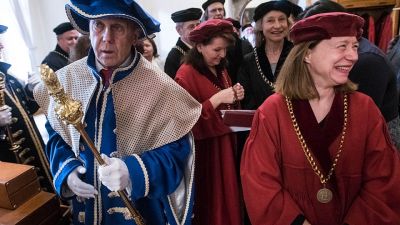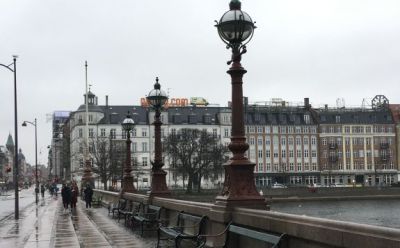Last Thursday, Charles University hosted the long-awaited Women in Science seminar, examining conditions of female experts in the Czech scientific and research environments. Invited speakers discussed both opportunities and barriers and as well as what needs to change.

From left: Charles University's Anna Shavit, Lenka Rovná and Milena Králíčková.
The Women in Science seminar was originally planned for the spring of 2020 on the occasion of the 80th anniversary of Milada Paulová's appointment as full professor at the Faculty of Arts of Charles University. Paulová became not only the first professor at Charles University but also the first woman in Czechoslovakia to achieve this highest academic rank. On this occasion, a special issue of CU’s Forum magazine was published but the conference had to repeatedly be postponed due to the pandemic, finally taking place in a hybrid format: some speakers and attendees met on site at the Carolinum, while others joined proceedings online.
“It is an honour for Charles University to have a number of female personalities who have established themselves on its campus and who have made their mark at prestigious Czech and international research institutions. However, society is not always aware that the possibility of women studying and subsequently working in science is still a relatively recent issue and that their position in our country is far from ideal or comparable to the situation in other developed countries. Charles University is aware that this issue needs to be supported and promoted,” Milena Králíčková, vice-rectress for Student Affairs and the next rectress of Charles University said.
|
Ideas that resonated during the one-day conference • It can be hard-going without leaders and partner/family support. |
The first panel at the day-long conference focused on The Status of Women in Czech Science. One of the speakers, Hana Tenglerová from the Institute of Sociology of the Czech Academy of Sciences and the National Contact centre (The Centre for Gender & Science) presented findings of their research into the issue. She explained it was crucial that Charles University had begun to systematically address the topic of gender issues and equality. She was followed by Tereza Smužová from Charles University, who presented the Equal Opportunities Plan, which will be a prerequisite for receiving funding from Horizon Europe and possibly other projects from 2022 onwards.
“The satisfaction survey, which is one part of a larger equal opportunities audit at Charles University, ended on Monday. More than 2,500 employees took part in the survey. The audit also includes, for example, content analysis of documents and statistics. The aim is to obtain data that will be used as a basis for the creation of a specific equal opportunities plan,” Smužová explained.

Hana Tenglerová (left) and Tereza Smužová.
Flexibility is essential
“You can't succeed without the support of your family and your supervisors,” was the message of immunologist Jiřina Bartůňková, winner of the 2017 Milada Paulová Prize, from the Second Faculty of Medicine, who joined Jana Kalbáčová Vejpravová from Faculty of Mathematics and Physics, Vladimíra Petráková from the J. Heyrovský Institute of Physical Chemistry, and Alice Němcová Tejkalová, Dean of the Faculty of Science, in the next panel discussion. The scientists agreed that a huge advantage of the academic environment is flexibility, which is absolutely crucial, especially when combining work and parenthood. Not only for women but also for men (who sometimes opt for paternal leave).

From left: Alice Němcová Tejkalová (online), Jana Kalbáčová Vejpravová, Vladimíra Petráková and Jiřina Bartůňková.
Alice Němcová Tejkalová emphasised resilience. “People want things to work themselves out, but history shows that success is mostly about overcoming obstacles.” Vladimíra Petráková, a mother of four children and founder of Czexpats in Science, an association connecting Czech scientists and scientists abroad, who herself has a lot of experience abroad and has been leading a research group at the J. Heyrovský Institute of Physical Chemistry at the Czech Academy of Sciences since the beginning of the year, shared details about what helped her. “During my PhD, when I already had a daughter and was pregnant with my second child, my supervisor believed in me and gave me the opportunity to participate in a large European project even under these circumstances. This was very important for me career-wise and I was easily drawn back in. Trust and flexibility were key.”
At the same time, she admits that for a long time she struggled with society's expectations.
“In Germany, for the first time, I had a female mentor who I saw that it was possible, that if a woman wanted to, she could go back to work three months after giving birth. The systemic measures in place helped,” Petráková said.
Don’t wait for change, actively pursue it
The first bloc of the afternoon programme was about Achievements and Challenges for the Czech Republic and brought together the aforementioned Hana Tenglerová, Petr Konvalinka, the chair of the Czech Technology Agency, the former chair of the Czech Grant Agency, Alice Valkárová - a nuclear physicist and winner of the Milada Paulová Prize for 2015 and Petr Pavlík from Gender Studies at Charles University Faculty of the Humanities. The panel debated some of the main hurdles that remain and initiatives that have been taken to prompt or encourage organisations and institutions to take far more pro-active approaches.

From left: Petr Pavlík, Hana Tenglerová, Marcel Kraus, Alice Valkárová and Petr Konvalinka.
“After listing the measures for gender equality that academia or research funders have achieved in recent years, it would seem that we are keeping up with international standards. But looking at the statistical data on women in science, the Czech Republic finds itself at the tail end of the entire European Union. Activities to promote gender equality need to be developed, monitored, evaluated and maintained in the long term. Incentives from the European Union play an important role here - for example, the introduction of gender action plans, fairer conditions for support from support providers and, last but not least, a more gender-conscious environment in academia,” was how the moderator of the panel discussion, Marcel Kraus, from CU’s Centre for Knowledge and Technology Transfer summed up conditions.
The last part of the seminar was devoted to societal stereotypes and clichés in the perception of women in science, where the Vice-Dean for Student Affairs of the Faculty of Arts and Sciences Ladislav Krištoufek, the Head of the Gender Studies Programme at the Faculty of Arts and Sciences Věra Sokolová, political scientist Anna Shavit and physician and member of the Board of CU’s Academic Senate Anna Malečková, met.

From left: Anna Shavit, Věra Sokolová, Milena Králíčková, Anna Malečková and Ladislav Krištoufek.
Stereotypes about appropriate and inappropriate career paths for women and men or, for example, generic masculinity were discussed. “Professors, associate professors and scientists are often thanked at graduation ceremonies, but where are the women professors, associate professors and scientists? I make sure and point out that female and male students, professors and professors are always thanked,” said the moderator of the panel Milena Králíčková, who during the discussion recommended Facebook COO Sheryl Sandberg’s book Lean in: Women, Work and the Will to Lead (published in Czech in 2013). “The book does a great job of describing how we women often don't trust ourselves and, for example, sit in the corner of the room or second rows away from the table. No, let's sit in the front rows and at the table, it's the only way we'll get to speak,” the newly-elected rectress said. (It is well-worth mentioning that Prof. Králíčková in February will become the first rectress at Charles University since it was founded 673 years ago). The panellists agreed that many prejudices are ingrained in society, but who else but academia should be better suited to be agents of change?
What women biologists, physicists, chemists, mathematicians, sociologists, psychologists, psychiatrists, political scientists, philosophers, theologians, educators and many other scientists from 17 faculties of Charles University DO is a question Forum asked in the past. On the occasion of the International Day of Women and Girls in Science, which falls on 11 February to commemorate the crucial role of women in the scientific world and to encourage their involvement in research (see video below).























